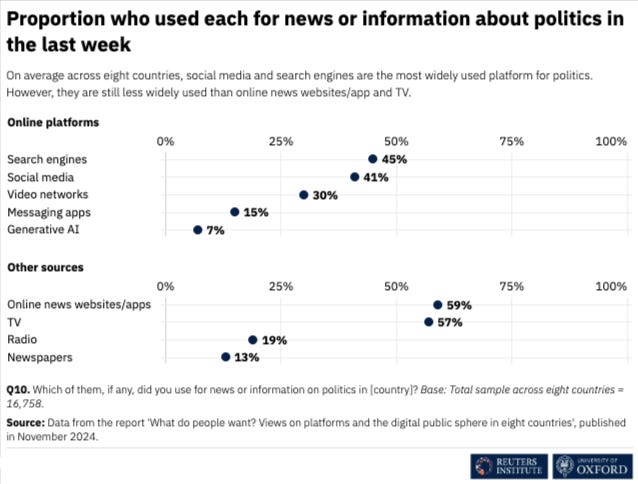The 239th Block: Not another TikTok politician
Is the creeping normality of extremism creeping at an extremely fast pace?
This week…
Your reading time is about 5 minutes. Let’s start.
I thank you for your replies to last week’s edition. I did not get a chance to respond to many of you, as I was also completing my assignment ahead of the deadline for my law studies, but I would like you to know that I read all of them and I am grateful that you have all reacted warmly.
Your Wikipedia this week: Overton window
And now, a selection of top stories on my radar, a few personal recommendations, and the chart of the week. (Shout-out to Dan Milmo for writing several bangers this week in The Guardian.)
ICYMI: The Previous Block was about the arts. FWIW:
Crypto entrepreneur eats banana artwork bought for $6.2m by Alex Loftus for BBC.
How the museum of West African Art is different in Baobab, riffing off Samuel Reilly‘s piece($) in Apollo Magazine.
CORRECTION NOTICE: None notified.ON THE MEDIA
X trying to block transfer of platform’s InfoWars accounts to The Onion
Dan Milmo for The Guardian:
Elon Musk’s X is trying to block the transfer of the platform’s InfoWars accounts to The Onion after filing a legal objection stating that it owns users’ accounts.
The social network has filed a “limited objection” to the sale of InfoWars, a media platform run by the conspiracy theorist Alex Jones, to the satirical news outlet The Onion.
Although X said it did not oppose the sale as a “general matter”, it is arguing that its users do not own their accounts and cannot sell or transfer them without its permission.
You think you own your the accounts you created? Loosely linked:
Online influencers need ‘urgent’ fact-checking training, warns Unesco by Dan Milmo for The Guardian.
A fifth of children use fake age on social media by Liv McMahon, Tom Singleton, and Georgina Hayes for BBC.
Australia’s social media ban for kids under 16 just became law. How it will work remains a mystery by Lisa M. Given (RMIT University) for The Conversation.
Public participation and digital propaganda in Indonesia by Aqida Salma for Fulcrum.
Pakistan tests secret China-like ‘firewall’ to tighten online surveillance by Abid Hussain for Al Jazeera.
Israel’s media crackdown is bad news for press freedom by Tania Krämer and Felix Tamsut for DW.
ON THE FAR-RIGHT
How a little-known far-right candidate manipulated TikTok to rise to the top in the Romanian election
Anda Iulia Solea (University of Portsmouth) for The Conversation.:
Relatively unknown until the 2024 elections, Călin Georgescu has gained significant popularity on social media in recent years. His TikTok account, which was set up in 2022, has more than 400,000 followers and millions of views. Numerous accounts, groups and pages in his support have also proliferated on Facebook, Instagram, and X.
Georgescu’s campaign has been unconventional. He has no headquarters, has refused to join major TV debates, and has no affiliation with a political party. Georgescu has flooded Romanian TikTok with short clips of himself attending church, running and appearing on podcasts.
Elsewhere on TikTok, users have produced viral clips highlighting Georgescu’s controversial stances, with colourful subtitles and dramatic music. There is even a TikTok sound dedicated to his campaign, including the lyrics “We vote for Călin Georgescu”. This sound has, at the time of writing, featured in 11,800 posts.
Loosely linked:
How the far right is weaponising AI-generated content in Europe by Ben Quinn and Dan Milmo for The Guardian.
Belgium’s Romanians poised to propel the far right into power by Victor Jack for Politico.eu.
Romania’s far right expected to make gains in parliamentary election by Luiza Ilie for Reuters.
This is how social media made Swedish far-right extremism normal online by Anna Elisabeth Hasselström for ScienceNorway.
Other curious links, including en español et français
LONG READ | The underground university: During the Cold War, Oxford philosophers worked together to aid dissidents behind the Iron Curtain. I was one of them by Cheryl Misak for Aeon.
INFOGRAPHIC | Which countries recognise Palestine in 2024? by Al Jazeera. More European countries are recognising Palestine, including Slovenia as recently as June this year, as well as Ireland, Norway, and Spain in May.
Occidente debilita el derecho internacional y dibuja un nuevo (des)orden mundial por Olga Rodríguez en elDiario.es.
Para entender qué sucede en la judicatura por Jesús López-Medel en CTXT.
Los boletines independientes más seguidos de España contestan a mis preguntas por Mar Manrique en Fleet Street.
De bonnes nouvelles pour les souverainistes québécois par Alex B. Rivard et Benjamin Ferland dans Options Politiques.
Près de 10 M$ destinés à des artistes auraient été volés et convertis en cryptomonnaies par Cédric Lizotte dans Radio-Canada.
Loi sur l’IVG : où sont passées les quatorze minutes manquantes du discours de Simone Veil ? par Xavier Eutrope dans La revue des médias.
What I read, listen, and watch
I’m reading When the Tiger Came Down the Mountain (2020), the second novella in the Singing Hills Cycle by Nghi Vo. Wait, am I a furry?? Because..!
I’m listening to 404 Media’s podcast on Pokémon Go and the military industrial complex.
I’m watching a Bloomberg Original on brain-computer interfaces.
Chart of the week
The Reuters Institute at Oxford University released results from a new research on the public’s views on platforms and the digital public sphere in eight countries, including Argentina, Brazil, Japan and South Korea. On average, social media and search engines are the most widely used platform for politics. However, they are still less widely used than online news websites, app and TV.







